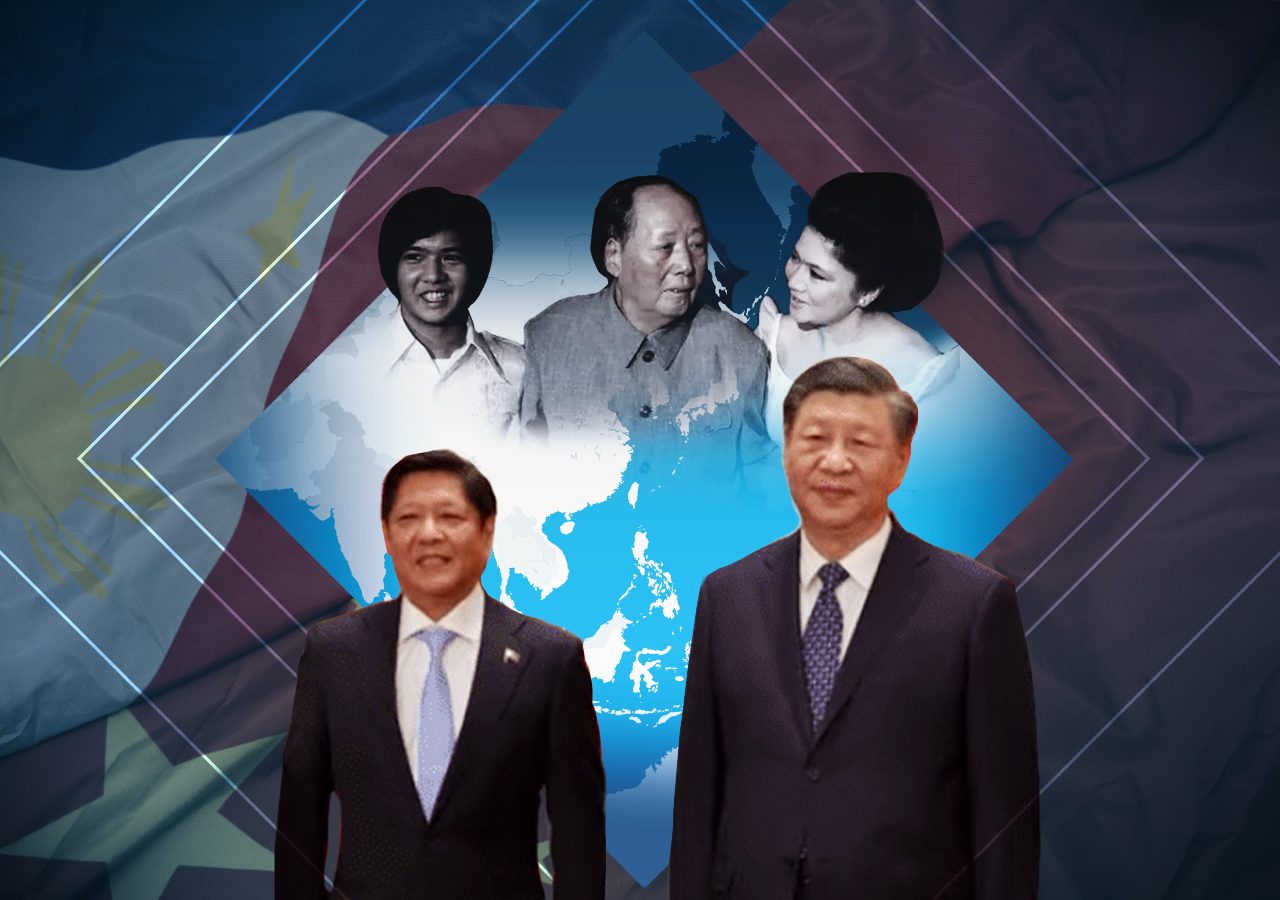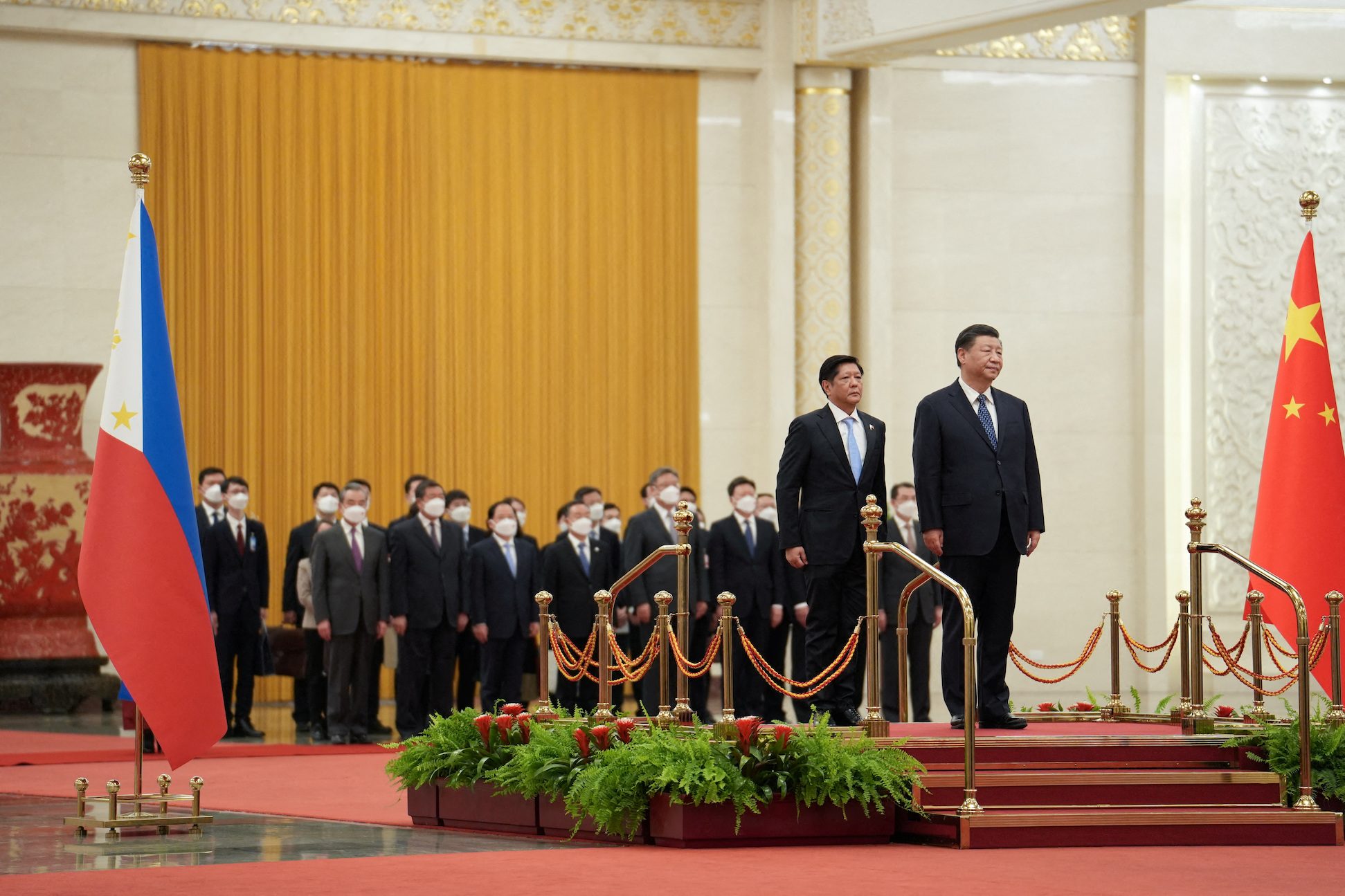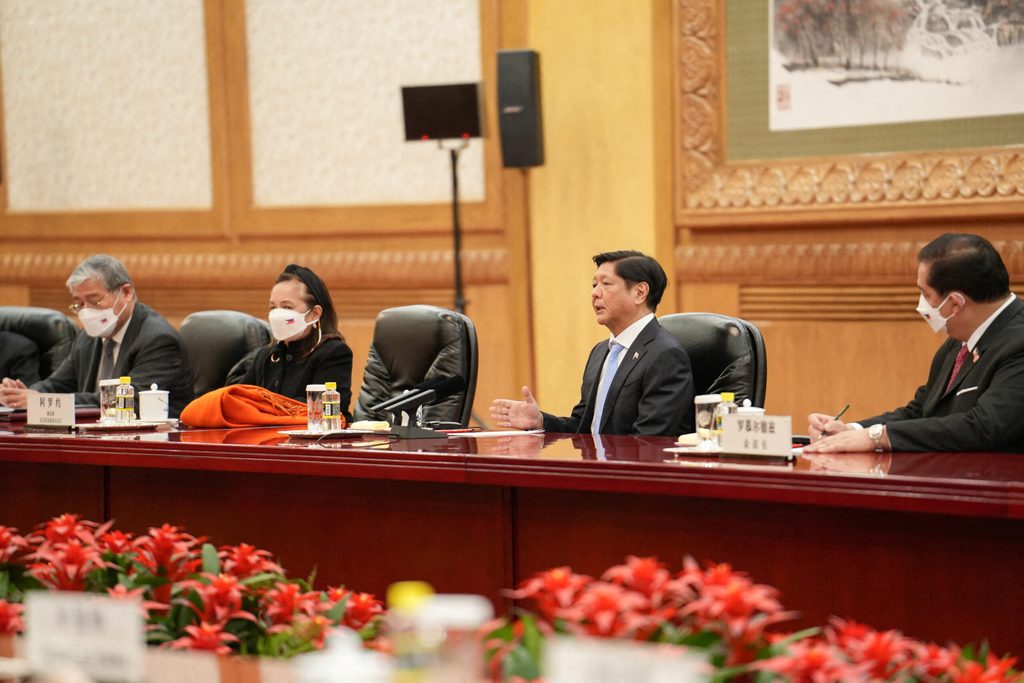SUMMARY
This is AI generated summarization, which may have errors. For context, always refer to the full article.

MANILA, Philippines – In his first few months so far as the Philippines’ highest leader, there is no trip Ferdinand Marcos Jr. harks back to more than the one he took to China as a young man in 1974.
Then the presidential son, Marcos, 17 at the time, traveled with his mother, Imelda, for a 10-day visit to the neighboring nation, which would later become one of the family’s most historic overtures to a foreign government to date.
The highlight of the visit was the Marcoses’ meeting with Mao Zedong, the communist leader and founder of the People’s Republic of China. Clad in a slim-fitting barong, Marcos and his mother flanked Mao in a photo from the visit, which served as a prelude to diplomatic relations being established between Manila and Beijing in June 1975.
“Until now, so many years later, I still can’t forget that. I can’t believe that I was there, that I saw Chairman Mao Zedong. I thought to myself, I am one lucky child because I got to be a part of this important moment between the Philippines and China,” Marcos said in a vlog.
The moment was captured by the international press – though most foreign accounts of the meeiting would see the younger Marcos left out. Sullen over his exclusion, Marcos said he resorted to requesting the Chinese embassy in Manila for a copy of the photo with Mao.

Nearly 50 years later, Marcos, back in China for a state visit as the Philippines’ leader, would share the same story with Chinese President Xi Jinping. This time, the Chinese leader was prepared with his own printed copy of the photo, which he presented to Marcos before a banquet in the Great Hall of the People.
It was a moment that captured yet another beginning in Philippine-China ties, where two popular leaders bank on history – partly political, partly personal – to usher in a new chapter for the two countries.
At the end of Marcos’ state visit, both leaders shared optimism over a new “golden age” in ties, where cooperation would flourish and pragmatism would prevail. But as both countries have hailed one golden age to the next, how different might one under the younger Marcos be?
Mature ties
In the weeks following his landslide victory, a foremost question Marcos faced was this: What might his policy toward China look like?
Marcos inherited ties that had just swung from one extreme to another. After relations fell to a historic low under the Aquino administration, which took China to court for its actions on the West Philippine Sea and won, Duterte moved the Philippines closer to China, restoring ties, but weakening Filipinos’ position in the territorial dispute.
Under his watch, Marcos spoke of developing a “maturity” in ties, where the two countries would “manage differences” on the WPS, so that other aspects of the relationship could move forward.
Philippine ambassador to the United States Jose Manuel Romualdez, Marcos’ relative, explained it like this: “Our policy as far as China is concerned is, we are trying to reach out to them, but now in a more direct way in terms of the issues surrounding South China Sea,” he said in a recent discussion hosted by the Center for Strategic and International Studies.
Romualdez likewise underscored Marcos’ effort to rebalance the key relationship, saying, “We feel there is a bigger picture to it and again, going back to more exchange(s) of ideas on economic prosperity for other countries is more important than anything else.”
Marcos sought to demonstrate this himself. After arriving in the Philippines, Marcos highlighted a meeting with Xi, where he said that while the Philippines was “more than willing to cooperate whenever possible,” the two countries’ dispute remained a “significant concern.”

Jumping on the Marcos administration’s efforts to paint the Philippines as ripe for and open to investments, China agreed to import “quality agricultural produce from the Philippines,” including goods such as mangosteen and durian.
Marcos called it the “durian protocol,” while the DFA cheekily referred to it as “durian diplomacy” – both terms referring to China’s promise to fix the trade imbalance between the two countries.
The economy has been at the forefront of Marcos’ messaging as he hops around the world. From New York to Brussels, the President and his economic team has made it a point to emphasize the supposed “shift” under his administration – toward joint ventures, public-private partnerships, government-to-government deals, and upping the private sector’s role in economic growth.
Marcos’ team has likewise tried to entice more foreign investors by capitalizing on Republic Act Number 11647, a Duterte-era law that liberalized foreign ownership of Philippine business, including micro and small enterprises.
A “sizable” business delegation joined Marcos in China, joining him in meetings with the agribusiness, renewable energy, mineral processing, and e-vehicles sector. From those meetings, the Palace said, the Philippines was promised $22.8 billion in investment plans and $2.1 billion in trade purchase intentions.
Marcos himself estimated that the pledges would result in between 10,000 to 30,000 jobs – in theory, at least.
Key players
Growing more mature ties, at least in the Marcos 2.0 era, also means building on long-running relationships, including personal ones.
Among the most prominent members of the delegation to Beijing was former president Gloria Macapagal-Arroyo, whose first appearance at a Marcos presidential visit was in November 2022 for the Asia Pacific Economic Cooperation (APEC) Summit in Bangkok. It was on the sidelines of APEC that Marcos met Xi for the first time. Arroyo, Xi’s “old friend,” was in the room too.
Marcos later concluded that Arroyo’s presence “helped the tone” of the bilateral meeting.
Arroyo’s ties to China go deep, and are often controversial. The botched $329-million National Broadband Network-ZTE deal (NBN-ZTE deal) scandal saw Arroyo face charges for graft and a code of conduct violation. She was eventually absolved of the charges by the anti-graft court Sandiganbayan and later, the Supreme Court.
It was also under Arroyo’s decade-long reign when Manila and Beijing saw another chapter of “golden ties.” A 2008 Newsbreak special report on Arroyo’s dealings with China showed that she signed 65 bilateral agreements in seven years, averaging 9 to 10 agreements yearly.
Marcos now refers to Arroyo as “our consultant who actually was leading the way in many of our meetings.”
With Marcos, too, was his sister Senator Imee Marcos who, up until the China visit, had never been a part of her younger sibling’s work trips. Fifty years back, Senator Marcos was part of a state visit delegation led by her father, the late dictator, when he formalized ties between China and the Philippines.
Senator Marcos currently heads the Senate committee on foreign affairs and had said before that Manila should not be made to choose between Beijing and Washington.
President Marcos has staked much on his push to strengthen the Philippines’ economic diplomacy, packaging trips abroad as essential for the country’s post-pandemic recovery. His visit to China was the 7th international visit he’d taken since first assuming office in June 2022.
Speaking at the APEC CEO Summit in Bangkok, the Philippine president said: “The issues that the world faces now – from climate change, to inflation, to war – are viewed by the ordinary Filipino through the lens of food security.”
While Marcos was in China, government figures showed inflation in December 2022 hit a 14-year high of 8.1%, fueled mostly by agricultural products. Marcos told Philippine media in China that improving the country’s agriculture production is “central.”
Marcos is concurrently the Philippines’ agriculture chief.

Reality check
For all of Marcos’ optimism, key outcomes of his China visit already face challenges.
On the West Philippine Sea, for instance, Marcos and Xi both agreed to restart talks on possible oil and gas activities. The Philippine government earlier said it was open to a fresh round of negotiations owing to the urgency of tapping potential oil reserves in Philippine waters.
For years, experts have warned that the Philippines faces a looming energy crisis, with the Malampaya gas field project scheduled to expire in 2024. The gas project supplies 20% of gas-fired plants contributing to the Luzon grid and is expected to run out in three to five years.
But just days after Marcos’ visit, the Philippine Supreme Court threw a wrench in potential talks, throwing out as unconstitutional the Arroyo-era Joint Marine Seismic Undertaking (JMSU). The deal, signed in 2005, was a tripartite deal where the Philippines, China, and Vietnam had agreed to extract oil in a portion of the West Philippine Sea.
The decision, released 15 years after the JMSU was challenged, imposed clearer legal limits on oil exploration activities in Philippine waters. In particular, the High Court ruled that “the exploration, development, and utilization of natural resources shall be under the full control and supervision of the State.”
According to maritime lawyer Jay Batongbacal, the Court’s decision “may rule out any form of joint exploration and development of petroleum resources in the West Philippine Sea unless done in accordance with the current service contract system.”
The task of restarting a fresh round of negotiations may be more difficult then, considering the Philippines’ service contract system itself had been a point of contention between Filipino and Chinese officials. The talks, along with a memorandum of understanding, were ultimately terminated owing to constitutional constraints.
Any effort to cooperate with China in the WPS has likewise faced steep opposition, with Filipinos expressing little trust in China, as well as strong demand for the government to protect the country’s resources in the volatile waters.
As of June 2022, a Pulse Asia survey showed only 3 in 10 Filipinos expressed trust in China. The figure has hardly changed in recent years, with Filipinos sharing similar sentiments since pollsters first started gauging public sentiment on the issue in 1994.

China’s sincerity
As Marcos deals with China, regional observers likewise continue to keep watch on China’s sincerity.
This would perhaps be most evident once again in the WPS and Manila and Beijing’s proposal to set up a direct communication line between the Department of Foreign Affairs’ Maritime and Ocean Affairs Office and the Chinese foreign ministry’s Department of Boundary and Ocean Affairs.
Marcos had earlier attributed confrontations in the tense waterway to “a lack of communication” between the two countries, and expressed optimism that improving such could reduce tensions and avoid confrontation. While no details on the deal have been disclosed, most observers believe this to be similar to crisis-communication hotlines set up between the United States and China.
Experts have viewed the development as a positive for both countries, but also cautioned it may result in a mere gesture of goodwill. Avoiding clashes, after all, would require China to answer any such line.
“In the past, the hotlines that have been set up have just rung, kind of endlessly in empty rooms,” said Kurt Campbell, who is the Biden administration’s Indo-Pacific coordinator, in a 2021 interview with the Guardian.
Batongbacal added, “The real problem is that the other side has taken positions it seeks to impose on us…. They say one thing in diplomatic meetings, but the actions on the ground show they are doing another thing.”
“That is not an issue of communication between the two counties. That is an issue of sincerity,” he said.
On the economic front, experts pointed out that even under Duterte, who prioritized friendlier ties with Beijing, most of the $24 billion in pledges secured from China had not materialized.
“As we have seen, very few [pledges] have really been realized and therefore it creates a wrong notion on the relationship. Is it only about the pledges? And what does that say about the Philippines’ relationship with China?” said Jan Robert Go of the University of the Philippines political science department.
For international affairs analyst Renato de Castro, the Marcos administration should continue to diversify its economic partners.
“Let’s look for other options…. Let’s not put our eggs in one basket, and a basket that is very dangerous, historically,” De Castro said in an interview on ANC Headstart.
What’s at stake
Still, an increasingly volatile global landscape, coupled with growing domestic challenges such as food security and inflation, have forced Marcos to ensure that growing maturity in the Philippine-Chinese ties will deliver concrete results for Filipinos.
De Castro, for one, said Marcos has room to maneuver with China.
“We have an administration, a president who, I believe, is more calculating. Our leverage against China stems from the fact that we have allies like the United States…and what President Marcos did was to repair our alliance with the United States, strengthen our partnership with the West. So this gives us a certain degree of leverage,” he said.
Marcos has presented himself as a history-steeped figure, once a presidential son who paved the way for diplomatic ties, and now the Philippines’ leader entrusted with fostering a future with China.
“Now, I am destined to be the president for the next six years. It’s my honor and my responsibility to build on this good relationship that’s lasted over 50 years,” said Marcos.
But diplomacy requires much more than destiny. At stake is not only his family’s legacy, but a vision of a better Philippines that Marcos has promised, time and time again. – Rappler.com
Add a comment
How does this make you feel?
![[In This Economy] Marcos’ POGO ban is popular, but will it work?](https://www.rappler.com/tachyon/2024/07/thought-leaders-marcos-pogo-ban.jpg?resize=257%2C257&crop=255px%2C0px%2C720px%2C720px)
![[Rappler Investigates] POGOs no-go as Typhoon Carina exits](https://www.rappler.com/tachyon/2024/07/newsletter-graphics-carina-pogo.jpg?resize=257%2C257&crop=424px%2C0px%2C1080px%2C1080px)





![[Just Saying] SONA 2024: Some disturbing points](https://www.rappler.com/tachyon/2024/07/TL-marcos-sona-points-july-23-2024.jpg?resize=257%2C257&crop=335px%2C0px%2C720px%2C720px)





There are no comments yet. Add your comment to start the conversation.